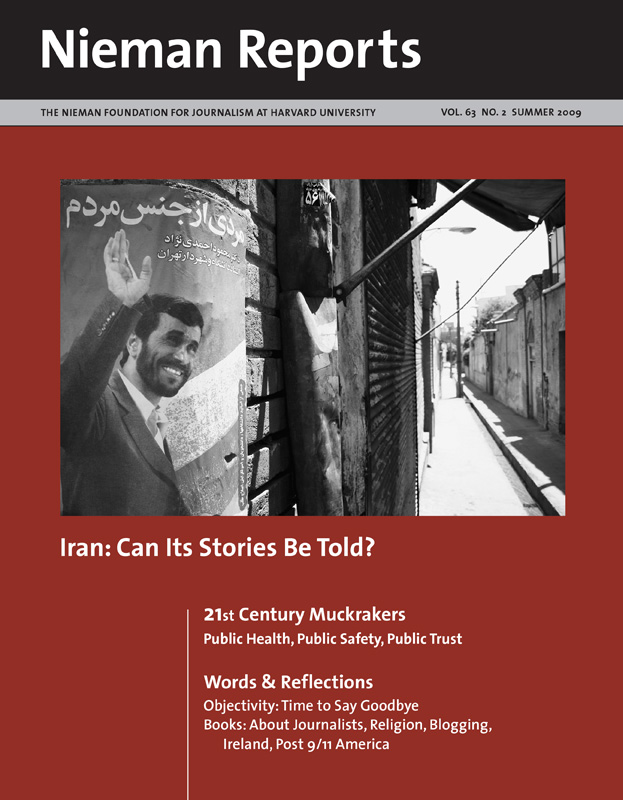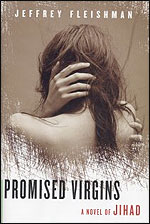Jay Morgan, the central character of Jeffrey Fleishman’s thought provoking “novel of Jihad,” carries an undeveloped roll of film shot by his young photographer wife in the moments before she was killed in Beirut. Morgan lifts her wounded body to safety, but she dies anyway. It’s a fitting image on which to build Morgan’s deep bitterness and disillusion about journalism as he covers the war in Kosovo. In these days of cyberjournalism, idiotic reader “talkbacks” and nonsensical newsroom cutbacks, the only thing apparently more useless to the media industry than an undeveloped film or a dead photographer is a living foreign correspondent.
The story of “Promised Virgins” revolves around Morgan’s trek through the mountains as he interviews Serbs, Albanians and CIA operatives on the hunt for a newly arrived jihadi who has brought Islamic fundamentalism to the otherwise nationalistic Muslims of Kosovo. In truth, the book is about a foreign correspondent’s uncomfortable personal connections with the society he covers and his realization that they’re the only things keeping him from despair at his ever-shabbier trade. The author mainly hangs that feeling on the unconsummated sexual relationship Morgan shares with his translator, Alija.
When Morgan, who narrates the novel in first person, describes Alija, we get the book’s finest moments. It seems possible from the vigor and poetry of those passages that there was someone like this for Fleishman, who reported from the Balkans and is now Cairo correspondent for the Los Angeles Times—someone local who lit him up creatively by the sheer foreignness of her being. It’s the kind of connection that’s beyond journalism to capture and, no doubt, one of the reasons he wanted to write this novel in the first place. By contrast the scenes of Morgan with another journalist interviewing sources are numbing and emotionally empty.
When the first of my Palestinian crime novels, “The Collaborator of Bethlehem,” was published in 2007, I approached most of the American correspondents in Jerusalem to ask them to write about the book. My pitch: An experienced journalist grows discontented with journalism’s limitations and turns to fiction as a more accurate way to reflect the reality of life in the Middle East. No correspondent argued with me; most interviewed me with sympathy, swapping stories of the way their own publications failed to make use of the depth of their knowledge. The truth is that a foreign correspondent who spends any time with the people he covers, who doesn’t just interview them and go off to drink with the other hacks at the hotel bar, will uncover realities that don’t fit the black and white formula of journalism. These snippets of reporting—these glimpses of gritty reality—are the ones likely to be woven into a fictional account, given the layers of emotional depth they explore.
The duality of Fleishman’s novel is a perfect illustration of this. Alija’s personal story and her response to it is a compelling mystery that Morgan unravels gradually, almost by touch, as they sleep together. In contrast, Morgan spends the rest of the book on the trail of the jihadi in the mountains, which never seems like the big story he thinks it is and, in the end, turns out to be a bit of a dud. But Fleishman toys with us, seeming to promise that there’ll be a journalistic payoff for Morgan, when in fact this story will retreat into insignificance beside the wrenching climax of his relationship with Alija. What you learn from the journalistic preference for promiscuous interviewing, Fleishman seems to say, isn’t a patch on the insights gained in a single, deep relationship with a local.
The question that faces many foreign correspondents is whether to take their collection of exotic rugs, local robes, and war stories back to where they came from, exhibiting them like trophies in their suburban homes while commuting to the op-ed desk, or to remain with the people they’ve covered and learned about. That doesn’t necessarily mean staying in one location, as I’ve done—13 years in Jerusalem and counting. It can also involve a commitment to delve into the emotions that people who are no longer strangers unfold for you and to recount your responses. Usually, this will mean a turn to fiction. Journalistic memoirs require a personal, emotional narrative that few correspondents can supply, since most of them spent their time, like Fleishman’s Morgan, interviewing people, filing and drinking, all rather dull activities when recounted in print. Rather it’s what they heard and saw, not what they did, that has often burrowed its way inside of foreign correspondents and, in time, this tugs them into fiction.
The human connection with local people is, I think, what saves foreign correspondents from the worst effects of the dreadful things they see. (Most foreign correspondents are after all really war correspondents.) During the drafting of my second Palestinian novel, “A Grave in Gaza,” I often cried as I wrote. At the time I thought, “Man, I’m good. I can even write myself into tears.” Only when I had finished did I realize that my weeping was the result of the traumas I had expelled onto the page. Once I understood this, I noticed that the tears and quick rages and nightmares about burned, dismembered bodies, ceased. That would not have happened if I hadn’t been able to connect on the page my feelings to the emotions of the Palestinians. The characters had to be real enough—I had to know the people on whom they were based well enough—for them to carry the weight of my own intense feelings of horror and shock.
I can’t say the same thing for journalism. As a reporter, almost the only time I cried over my copy was after I saw the edit.
Matt Beynon Rees is the author of “The Samaritan’s Secret,” the third in his series of Palestinian crime novels. “The Collaborator of Bethlehem,” which introduced his lead character, Omar Yussef, won the Crime Writers Association’s John Creasey New Blood Dagger that is given to the author of a first novel. He was bureau chief for Time magazine in Jerusalem. He wrote about his own turn to fiction in the Summer 2007 issue of Nieman Reports, www.niemanreports.org.
The story of “Promised Virgins” revolves around Morgan’s trek through the mountains as he interviews Serbs, Albanians and CIA operatives on the hunt for a newly arrived jihadi who has brought Islamic fundamentalism to the otherwise nationalistic Muslims of Kosovo. In truth, the book is about a foreign correspondent’s uncomfortable personal connections with the society he covers and his realization that they’re the only things keeping him from despair at his ever-shabbier trade. The author mainly hangs that feeling on the unconsummated sexual relationship Morgan shares with his translator, Alija.
When Morgan, who narrates the novel in first person, describes Alija, we get the book’s finest moments. It seems possible from the vigor and poetry of those passages that there was someone like this for Fleishman, who reported from the Balkans and is now Cairo correspondent for the Los Angeles Times—someone local who lit him up creatively by the sheer foreignness of her being. It’s the kind of connection that’s beyond journalism to capture and, no doubt, one of the reasons he wanted to write this novel in the first place. By contrast the scenes of Morgan with another journalist interviewing sources are numbing and emotionally empty.
When the first of my Palestinian crime novels, “The Collaborator of Bethlehem,” was published in 2007, I approached most of the American correspondents in Jerusalem to ask them to write about the book. My pitch: An experienced journalist grows discontented with journalism’s limitations and turns to fiction as a more accurate way to reflect the reality of life in the Middle East. No correspondent argued with me; most interviewed me with sympathy, swapping stories of the way their own publications failed to make use of the depth of their knowledge. The truth is that a foreign correspondent who spends any time with the people he covers, who doesn’t just interview them and go off to drink with the other hacks at the hotel bar, will uncover realities that don’t fit the black and white formula of journalism. These snippets of reporting—these glimpses of gritty reality—are the ones likely to be woven into a fictional account, given the layers of emotional depth they explore.
The duality of Fleishman’s novel is a perfect illustration of this. Alija’s personal story and her response to it is a compelling mystery that Morgan unravels gradually, almost by touch, as they sleep together. In contrast, Morgan spends the rest of the book on the trail of the jihadi in the mountains, which never seems like the big story he thinks it is and, in the end, turns out to be a bit of a dud. But Fleishman toys with us, seeming to promise that there’ll be a journalistic payoff for Morgan, when in fact this story will retreat into insignificance beside the wrenching climax of his relationship with Alija. What you learn from the journalistic preference for promiscuous interviewing, Fleishman seems to say, isn’t a patch on the insights gained in a single, deep relationship with a local.
The question that faces many foreign correspondents is whether to take their collection of exotic rugs, local robes, and war stories back to where they came from, exhibiting them like trophies in their suburban homes while commuting to the op-ed desk, or to remain with the people they’ve covered and learned about. That doesn’t necessarily mean staying in one location, as I’ve done—13 years in Jerusalem and counting. It can also involve a commitment to delve into the emotions that people who are no longer strangers unfold for you and to recount your responses. Usually, this will mean a turn to fiction. Journalistic memoirs require a personal, emotional narrative that few correspondents can supply, since most of them spent their time, like Fleishman’s Morgan, interviewing people, filing and drinking, all rather dull activities when recounted in print. Rather it’s what they heard and saw, not what they did, that has often burrowed its way inside of foreign correspondents and, in time, this tugs them into fiction.
The human connection with local people is, I think, what saves foreign correspondents from the worst effects of the dreadful things they see. (Most foreign correspondents are after all really war correspondents.) During the drafting of my second Palestinian novel, “A Grave in Gaza,” I often cried as I wrote. At the time I thought, “Man, I’m good. I can even write myself into tears.” Only when I had finished did I realize that my weeping was the result of the traumas I had expelled onto the page. Once I understood this, I noticed that the tears and quick rages and nightmares about burned, dismembered bodies, ceased. That would not have happened if I hadn’t been able to connect on the page my feelings to the emotions of the Palestinians. The characters had to be real enough—I had to know the people on whom they were based well enough—for them to carry the weight of my own intense feelings of horror and shock.
I can’t say the same thing for journalism. As a reporter, almost the only time I cried over my copy was after I saw the edit.
Matt Beynon Rees is the author of “The Samaritan’s Secret,” the third in his series of Palestinian crime novels. “The Collaborator of Bethlehem,” which introduced his lead character, Omar Yussef, won the Crime Writers Association’s John Creasey New Blood Dagger that is given to the author of a first novel. He was bureau chief for Time magazine in Jerusalem. He wrote about his own turn to fiction in the Summer 2007 issue of Nieman Reports, www.niemanreports.org.

 Promised Virgins: A Novel of Jihad
Promised Virgins: A Novel of Jihad

